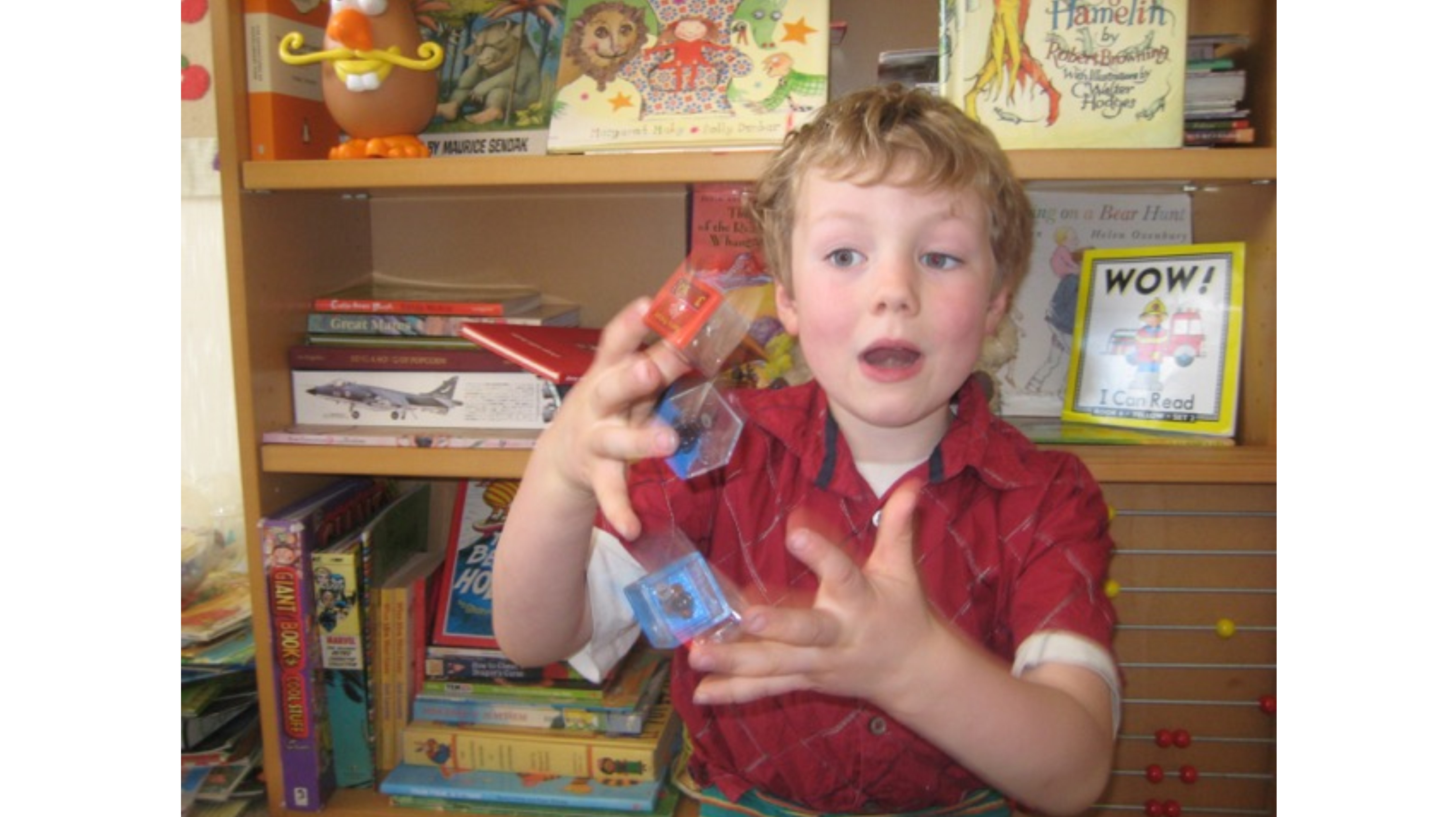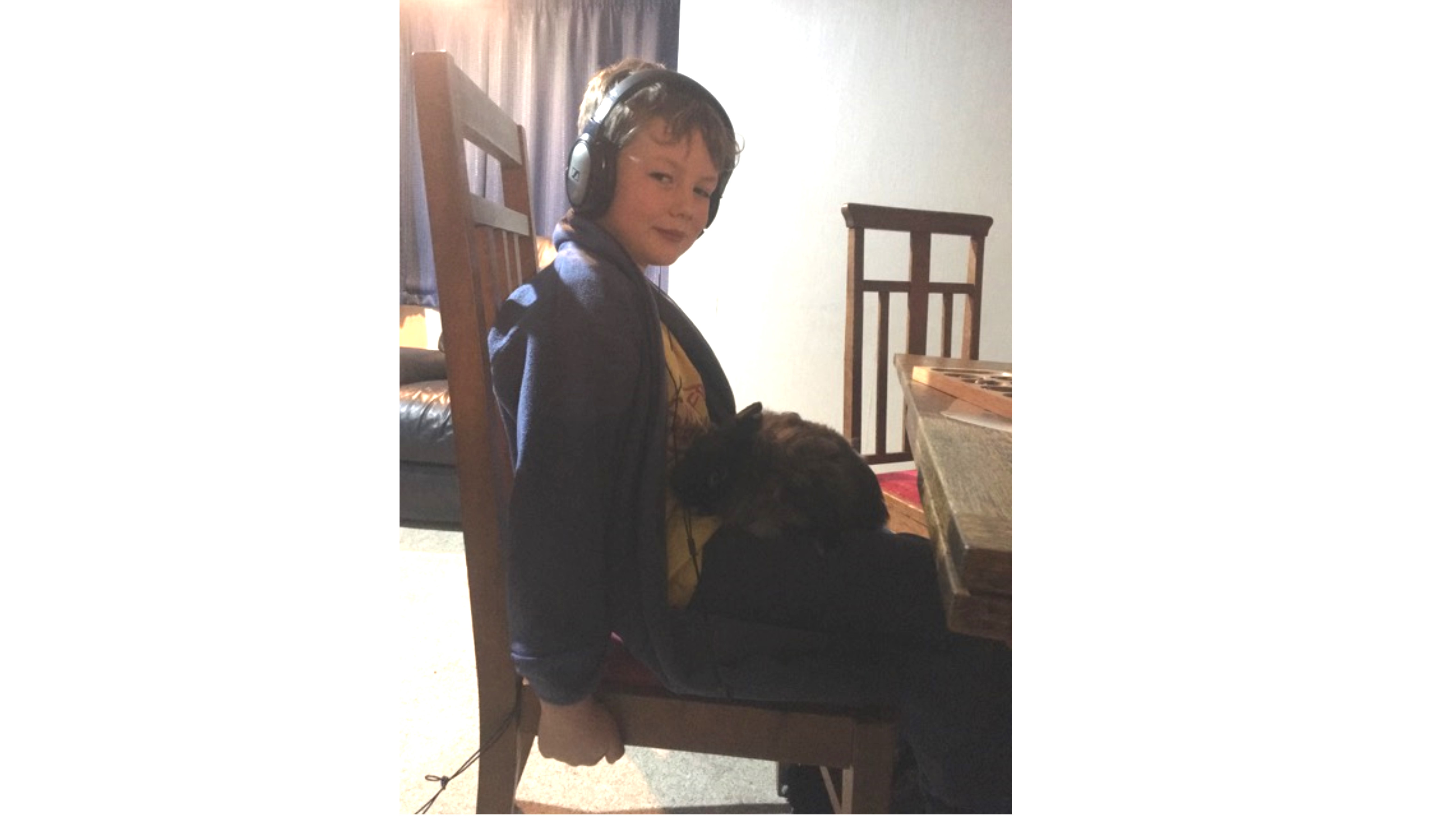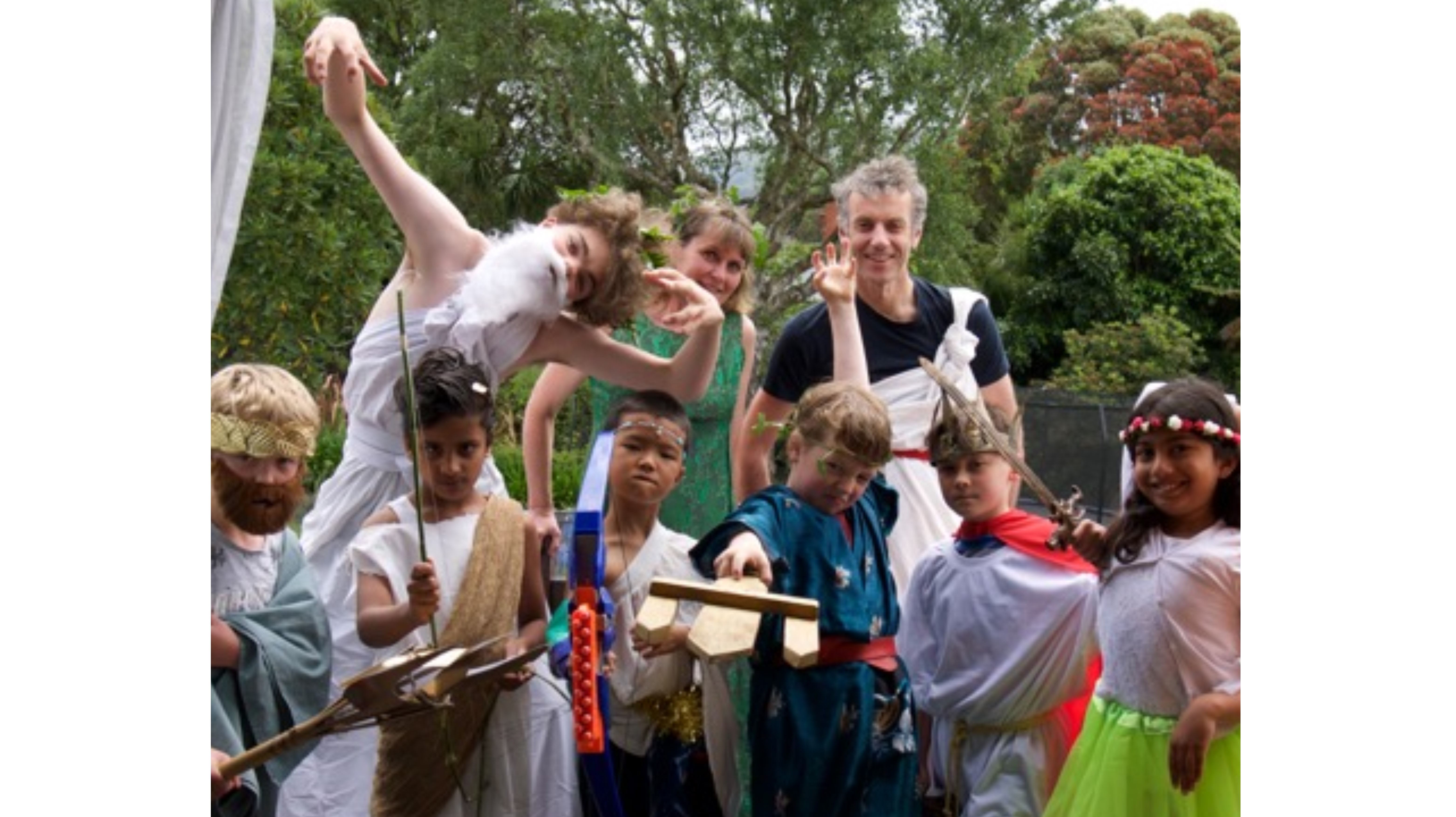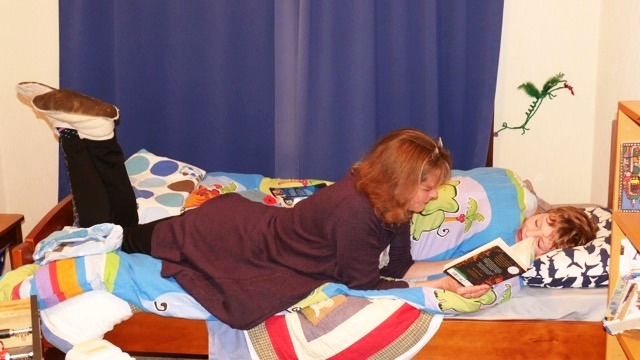Emma Neale is a Dunedin-based poet, novelist, and recently appointed editor of the esteemed New Zealand literary journal, Landfall, which has been running for over 70 years. She tells us, hilariously and poignantly, about the books her two sons are reading and answers an important question: ‘How would you fry a car?’.

What does ‘story time’ look like at your house?
Story time happens wherever you can fit a boy, a parent and a book. Although our youngest reads to himself often, he still likes to be read to while he’s in the bath; or in bed; or in the living-room on the couch; or in the shared adult bed; or lying under the trampoline with the pet rabbit, as the rabbit trains for the Guinness Book of World Records’ Fastest Grass Nibbler 2018. Occasionally, if our eldest, Abe (16), has had a particularly rough day, he’ll quietly sidle up and listen momentarily, too.
One of the things I love about reading aloud to Zac (8) in a communal space is that sometimes, I think my husband Danny has completely dissolved inside a quantum physics formula on his laptop, but I’ll reach a certain passage, and a cry of surprise, or shock, or delight comes from him – ‘What? They can’t do that to her, can they?!’ and I realise he’s been pulled into the ripples and current of the story too.
My husband and Abe, both read to Zac too; my husband has read Mark Twain’s Tom Sawyer and The Adventures of Huckleberry Finn aloud to Zac; and Abe will still sometimes read one of his old Andy Griffiths Treehouse books to his brother. When Abe was younger, I sometimes overheard them getting lost in a shared Griffiths-seeded, surreal, free association:
A: Imagine if the flying fried egg car actually hatched a chicken.
Z: You said frying flyed egg car.
A: Gross. A car made of fried flies’ eggs.
Z: No, a car that was frying and — no, it had flies’ eggs on it.
A: Super gross. Anyway how would you fry a car?
Z: In a giant big ginormous hugest pan.
A: In engine oil ha, ha!
Z: Hahaha, Mum, Mum! How would you fry a car?
E: In engine oil.
Z: How did you knowed that?
With all his music and school commitments, our 16-year-old has much less time for leisure reading now, but he does pore over song lyrics. He recently became absorbed in John Wyndham’s The Chrysalids, and he had to read Orwell’s 1984 as school-assigned reading. It’s such a kick to see him go through our bookshelves when he has to do a reading response for homework, and see him independently select Janet Frame short stories, or poems by New Zealanders from anthologies I have, and see what tone or angle has captured his imagination. He chooses poems I wouldn’t have, but I love the fact that the artform still reaches him, and I think it will inevitably help his lyric-writing. He’s just picked up Ted Dawe’s Into the River from a pile of other writers I’d recommended he try: he’s partly curious about the media controversy he remembers from when he was 14, though when he tried out the first few pages of the other books, this one seemed to hook him fast.

What are some of the books your kids have been obsessed with?
Zac was basically named by his brother, who was in a Zac Power reading phase when he was born. Both boys have had serious Andy Griffiths, Margaret Mahy, Jeff Kinney, J.K. Rowling, Gary Paulsen, Barbara Else and Neil Gaiman phases. They’ve also loved Wonder by R.J. Palacio, Holes by Louis Sacher, and the youngest played Kate De Goldi’s The Ten PM Question on audiobook so many times that we had to start insisting on headphones because much as we adore the book ourselves (years ago I edited the Longacre Press edition) we’d started to hide the CDs, and would feel nauseated even looking at the case. Happily, now enough time has passed since that period, that I can say the adults probably wouldn’t start to sweat if he put it back on the stereo … Though now we are almost at the same stage with Rick Riordan audio books. It’s back to the headphones again.
Zac has recently emerged from an Emily Rodda Deltora Quest phase and has been churning his way through re-reading and listening to all the Rick Riordan Percy Jackson and Magnus Chase books based on Greek and Norse mythology. These fuelled an obsession with wanting to make massive wooden tridents in celebration of Poseidon, and meant he asked for a ‘Greek Gods’-themed eighth birthday party last December. So far, no mistletoe arrows or spears to celebrate Loki, but there is a school holiday art and woodwork program coming up, so…

What are the kids’ books you like best?
I still have vivid memories of books from my own childhood, but these haven’t always crossed over into books my sons have enjoyed. So many… I read a lot of Enid Blyton when I first learned to read, and loved Dorothy Edwards’ My Naughty Little Sister books and Catherine Storr’s Polly and the Wolf series. For many years I dipped in and out of The Illustrated Treasury of Children’s Literature, edited by Margaret E Martignoni – it was full of nursery rhymes, Aesop fables, Lewis Carroll, Christina Rosetti, The Brothers Grimm, Dickens, Hans Christian Anderson and many others.
I used to read and re-read and dream about A Little Princess by Frances Hodgson Burnett; was thrilled when my youngest enjoyed this one too (smashing some of those creaky old gender paradigms!). When we moved to the US when I was about eight, I also discovered Marguerite Henry’s horse novels – Misty of Chincoteague and Stormy, Misty’s Foal, The White Stallions of Lipizza, Mustang, Wild Spirit of the West. I went through a Nancy Drew mystery phase; a Hardy Boys phase; a Little House on the Prairie phase; a Judy Blume phase; then, back in New Zealand, I had a Mary Renault phase, a Gerald Durrell phase, a Joan Aiken phase.
There were some magical novels by Penelope Farmer (which I’ve mentioned elsewhere) that I loved. There was her haunting Charlotte Sometimes, but the two that still transport me, even just recalling them now, were called The Summer Birds and Emma in Winter. In these, the characters in a small English village all share a night-time dream life where the children can fly, and in this night-realm, the fat boy in the village is released from his daily social ostracism. I was a pudgy child for a couple of years, and even ran away from school after a particularly bad bout of name-calling, so I loved the release the boy experienced in the story. These books were poetic, otherworldly.
As a teenager, I read a lot of science fiction: Ray Bradbury and John Wyndham, in particular, but I also remember that Andra by the Canadian Louise Lawrence was eerily gripping. It was published in 1971, and imagines a young girl 2000 years from then being given a brain graft from a boy who died in 1987. (I was reading it in 1982 or 1983, perhaps.) She starts to see through the totalitarian society she’s been born into, and to fight for independent expression. As a teenager I loved the rebellion in Andra’s character; I loved the idea of the two brains merging and working together in one person, and that the memories from one could be reanimated in a new body. I’m not sure how it would hold up now, or to an adult reader, but writing this makes me want to track it down again.

Bookshops or libraries…?
Both! After our last house move I had a brief attempt at being ascetic and swearing off ever buying another book because moving the crate-loads made me feel as if I had some sort of syndrome. But the asceticism didn’t last long. I am my syndrome.
We also visit the library regularly. One of the only ways I ever felt like I was even slightly on top of parenting when the boys were small was to come home from a library trip with about 30 new picture books. I loved reading aloud to them; loved the play of language, the comfort of the bright, primary-coloured imagery; sharing the surprise of the narratives; making the boys laugh by giving characters different voices. I loved the physical closeness of having the boys tucked in under my wing. I suppose it made me feel some sort of safety on the choppy seas of early parenthood.
Zac absorbed that sense of security, to the point where once, when he was about three and had barrelled into something, ending up with a massive cut and swollen bruise on his forehead, he went straight to the bookshelf while still dripping blood and wailing with pain. He seized on some books, and sobbed in the middle of the living room, ‘I think I need a story.’
Emma Neale
Emma Neale is a Dunedin-based writer and freelance editor. She currently edits Landfall. Her latest novel, Billy Bird, was short-listed for the Acorn Prize at the Ockham New Zealand Book Awards 2017 and long-listed in the Dublin International Literary Awards. She has one son at primary school and one at high school. Photo by Jim Tannock



